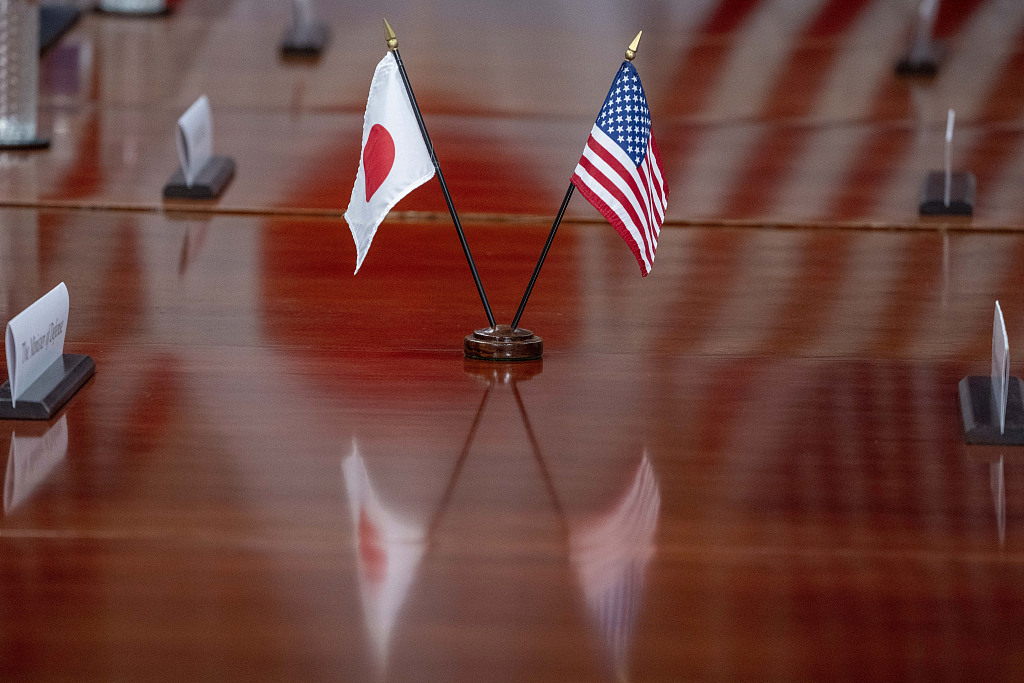Japan-US security ties may heighten tensions in Asia-Pacific, experts warn
By CAI HONG | China Daily Global | Updated: 2024-06-21 09:51

Japan and the United States have taken their security relationship to a new height, a move that might both create and escalate tensions in the Asia-Pacific region, experts said.
In a series of meetings held in Tokyo last week, the two countries agreed to set up working groups on joint missile production, warship and aircraft repairs and supply chain resiliency with the aim to promote defense industry cooperation.
US Ambassador to Japan Rahm Emanuel called the East Asian country's engineering, industrial and manufacturing capacity "a major significant development" for the US defense industry, while admitting that "the US military-industrial base cannot meet all the security challenges".
The US is currently facing a shortage of ammunition, which is largely attributed to its support for Ukraine and Israel, and is also grappling with the challenge of augmenting its Patriot missile production capacity.
The Patriot, a surface-to-air guided missile system, is manufactured by Japan's Mitsubishi Heavy Industries under license from US defense contractors Lockheed Martin and Raytheon Technologies. In December, the Japanese government confirmed that it would send Patriot missiles to the US after amending its arms export rules.
Japanese and US defense officials deliberated for the first time in Tokyo at the Defense Industrial Cooperation, Acquisition and Sustainment Forum, which was established based on an agreement reached between Japanese Prime Minister Fumio Kishida and US President Joe Biden during their meeting in April.
The US requires Japan, "the frontline of defense in East Asia", to repair its warships and aircraft, so that they can be returned to operation quickly, Emanuel said.
The first working group meeting on maintenance and repair of forward-deployed US warships at Japanese commercial facilities was held on June 11. The working group meeting on US aircraft repairs is scheduled for August, he said.
Liu Qingbin, a former professor at Yokohama National University's Institute of Advanced Sciences, said the US ambassador is using "China's capacity in shipbuilding as an excuse to build US-Japan military cooperation".
Masaki Fukasawa, commissioner of the Acquisition, Technology and Logistics Agency of Japan's Defense Ministry, said that increasing the opportunities for US naval vessels to undergo maintenance, repair and overhaul at Japanese shipyards would contribute to the readiness of US forces and strengthen the deterrence of the alliance as a whole.
Japanese analysts, however, expressed concerns over Washington using Tokyo as a key partner to boost its own military production. Japan may end up serving as a subcontractor because its defense industry is weak, they said.
Atsushi Koketsu, professor emeritus at Yamaguchi University of Japan, said that Japan's defense policy is increasingly drifting away from the country's pacifist Constitution, which forbids the use of force as a means to settle international disputes.
If Japan pursues deterrence by further building its military infrastructure and strengthening alliances without offering reassurances to China, it will inevitably result in a security dilemma for both countries, he said.
Koketsu added that the Japanese government should stop increasing militarization in the region and instead build friendly relations with neighboring countries.
The Chinese Foreign Ministry has repeatedly emphasized that US-Japan relations should not target other countries, harm their interests, or undermine regional peace and stability.
Lyu Yaodong, deputy director of the Institute of Japan Studies at the Chinese Academy of Social Sciences, said that Japan is acting in concert with the US' global strategy.
On the military front, Japan is forming a closer alliance with the US by extending support to the US' allies in East Asia and in other parts of the world, while on the economic front, Tokyo is joining Washington in its "decoupling and breaking chains" strategy against China, Lyu said.
According to Emanuel, the US ambassador, the meeting of the US-Japan Security Consultative Committee to be held in July is the "deadline" for achieving concrete outcomes in defense industry cooperation.
Liu, the former Yokohama professor, said that Japan's participation in producing weapons for the US shows the weakening strength of Washington. "And there is a strong desire within the Japanese government to strengthen the alliance and enhance deterrence against China through cooperation with the United States."
He said that Japan's decision to acquire long-range land-attack capabilities, as outlined in its National Security Strategy and National Defense Strategy in 2022, is a groundbreaking change for the country's Constitution.
"To meet these ambitions, Japan is embarking on greater acquisition of relevant technologies from the US under the framework of the US-Japan alliance, as well as developing indigenous long-range-strike and hypersonic capabilities while pursuing a whole-of-government approach aimed at achieving self-sufficiency in certain types of missile production," he said.
According to the Japanese newspaper Mainichi Shimbun, the Kishida government has picked up its pace for laying the legal groundwork to introduce preemptive "active" cyber defense, with related laws ready to be proposed as early as this fall's extraordinary Diet session.
"Such moves are posing threats to the region," Liu said, adding that although the US enlists Japan for weapons production, the scale of such cooperation has its limits.
During the defense forum, Emanuel himself emphasized that US nuclear-powered vessels such as submarines and aircraft carriers would be "off-limits".
























